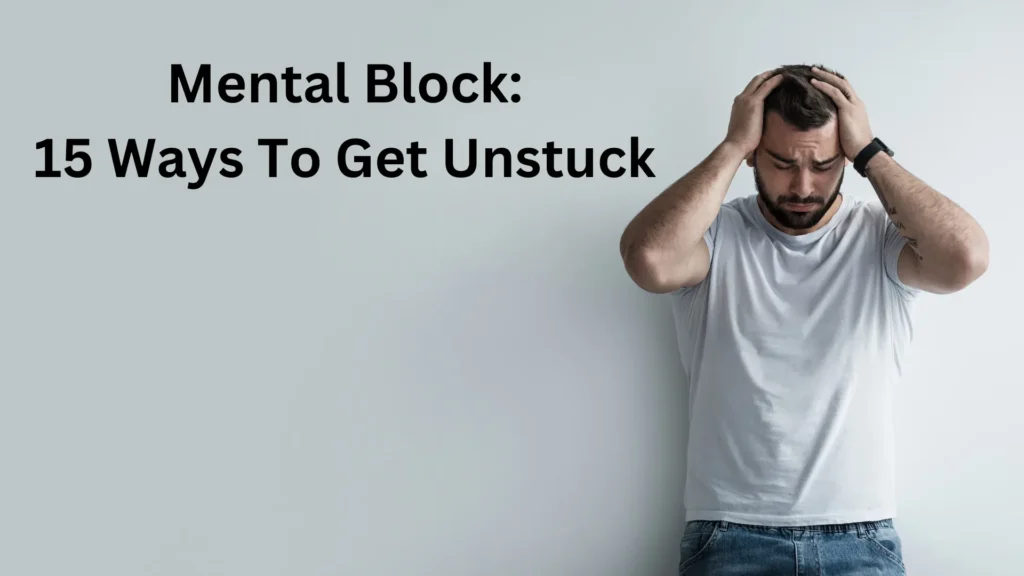Mental Block: 15 ways to get unstuck

Ugh, mental blocks are the worst.
They are frustrating both in the experience itself, and in the results they prevent.
They also happen to be the main reason athletes come to see me.
Something is in the way of being their best. And the harder they try to fix it, the more frustrated they become.
So in this article I will share what a mental block is, what it looks and feels like, what causes it, and, most importantly, how to get past them.
What is a mental block?
A mental block is a psychological barrier or obstacle that prevents a person from performing a task and achieving a goal.
It is a state of mind where a person feels stuck or unable to think clearly or creatively.
You can’t continue your train of thought.
Your creativity is blocked.
You can’t change your perspective or think of solutions to the problem in front of you.
Also described as mental fatigue, it feels like your brain stopped working.
Mental blocks can be caused by various factors such as fear, self-doubt, lack of confidence, past failures, or external pressures.
They can affect different aspects of life, including academics, sports, work, or personal relationships.
Overcoming mental blocks often requires identifying the underlying causes, developing strategies to manage negative thoughts and emotions, and practicing techniques to improve focus and concentration.
Let’s get into each of these issues below.
What does a mental block look and feel like?
There are many signs and symptoms of a mental block.
You don’t need to have all of these.
And they may vary depending on the individual and performance tasks (at work vs. in sport, for example). Here are some of the big ones:
Most people will complain they feel stuck or unable to move forward.
There is an inability to concentrate, an inability to think or reason clearly, and this results in a lack of motivation or drive.
Your productivity takes a hit.
You might be most in touch with anxiety or fear related to performance.
This can be characterized by negative thoughts and self-doubt. Many athletes come to me with racing thoughts and overthinking.
Feeling overwhelmed with tasks piling up is common.
That can lead to mental fatigue and just wanting to escape.
These thoughts and feelings lead to some behaviors that you can easily observe.
Most obvious is a drop in your performance or consistency in your quality of work.
Since none of this feels good, avoidance behaviors and procrastination are common.
Scrolling on your phone or social media, for example, temporarily relieves the stress of a mental block.
It won’t help you get things done, but the temporary relief it provides can keep us stuck.

What causes mental blocks?
Let me start by saying it isn’t your fault.
No one wants a mental block.
You didn’t do this on purpose.
At the same time, I hope that you will identify with some of these causes because then we can do something about them!
Stress plays a big, biological role in mental blocks.
When stressed, your body’s fight-or-flight response gets activated.
This ancient survival mechanism is great for outrunning predators, but not so much when you’re trying to sink a crucial free throw or close a major business deal.
Stress releases hormones like adrenaline that heighten your senses and prime your muscles for action.
However, it can also lead to cognitive tunneling, where your focus narrows down to a single point.
Often on the problem, unable to focus on a solution.
Anxiety is another big one.
When anxiety takes center stage, it floods your mind with negative thoughts and “what if” scenarios.
Overthinking, where you are so in your head that your body stops responding, is common.
So is fear of failure.
You stop taking risks and avoid the risk of failing in that risk. It keeps you safe and hurts performance.
This is particularly true with perfectionists who become overly focused on avoiding mistakes or achieving unrealistic standards.
They are blocked from focusing on what they do need to do in order to succeed.
Both stress and anxiety can lead to a lack of motivation.
When we depend on how we feel to determine what we do, this lack of motivation can create a big mental block.
I don’t feel like it, so I keep avoiding it.
Dangerous to let our emotions decide what we will and won’t do.
Sometimes mental blocks are the result of a lack of clarity or direction.
When individuals are unsure about their goals or lack a clear plan, it can lead to mental blocks characterized by indecisiveness.
And if you do know what you want, m, such as noise or interruptions, can disrupt concentration and contribute to mental blocks.
Lastly, mental blocks can occur when individuals are mentally and physically exhausted, making it difficult to think creatively or problem-solve effectively.
Inadequate sleep or struggling with the thoughts and feelings above can add to this extreme fatigue.
How can athletes identify specific triggers that lead to mental blocks?
That’s a long list of causes.
So which factors are playing a role in your mental block?
I’ve got a few ways to figure that out.
- First, pay attention to patterns.
Athletes can start by paying attention to any recurring patterns or situations where they experience mental blocks.
This could be during certain types of competitions, specific moments in a game, or even in practice sessions.
- Then notice what you are saying to yourself.
This is the most important part.
Stop and reflect on the impact those words are having on your mood and effort.
Athletes can also reflect on past experiences where they have faced mental blocks and try to identify any common factors or triggers.
This could include external factors such as crowd pressure, opponent’s behavior, or internal factors such as self-doubt or fear of failure.
- Athletes can seek feedback from coaches, teammates, or sport psychologists to gain insights into their mental blocks.
These individuals may be able to provide an outside perspective and help identify triggers that the athlete may not have noticed.
Journaling isn’t for everybody, but for those who like it, it can be a powerful tool for insight.
Keep a journal to record thoughts, emotions, and experiences before, during, and after competitions or training sessions. This can bring awareness to any patterns or triggers that contribute to mental blocks.
If athletes are struggling to identify specific triggers or manage their mental blocks, it may be beneficial to seek professional help from a sport psychologist.
These professionals can provide specialized guidance and support in identifying and addressing mental blocks.
How can a sport psychologist help athletes overcome mental blocks?
A sport psychologist can help athletes overcome mental blocks in the following ways:
It starts with education about the nature of mental blocks and how they can affect performance.
This includes explaining the psychological factors involved and providing information on strategies to overcome them.
I’m a fan of science.
I like to know why things happen, and even more why the strategies I suggest to overcome mental blocks will work.
Even if you don’t geek out on the science like I do, you will benefit from understanding there is a reason this is happening and proven ways to overcome it.
As you read above, mental blocks come in all shapes and sizes.
A sport psychologist will help athletes identify their specific mental blocks by observing their behavior, performance, and listening to their concerns.
Every individual is unique, and personalization of interventions is critical for success.
The way through mental blocks can be difficult.
A sport psychologist will provide emotional support and guidance to athletes, helping them navigate through their mental blocks.
This may involve offering reassurance, empathy, and understanding, as well as providing strategies and techniques to manage and overcome the blocks.
S/he will help set realistic and achievable goals to overcome the mental blocks.
This includes breaking down the goals into smaller, manageable steps and monitoring progress along the way.
Skill development is necessary to be independent in your performance.
The sport psychologist can’t be on the field or court with you in those critical moments.
So the development of specific mental skills and techniques to overcome mental blocks is paramount.
Ultimately, it is about enhancing your physical performance and improving outcomes.
Sport psychologists help athletes through their specialization in the mental and emotional game.
They are uniquely trained to address underlying psychological issues that contribute to mental blocks.

15 ways to overcome a mental block
Before we get into the following recommendations, please be sure to give yourself some time and grace to develop these skills.
There isn’t a quick fix.
With consistent effort using the strategies below, you can overcome your mental blocks.
- Prioritize action
Easier said than done, I know.
However we often pay too much attention to our feelings and sometimes act on the unspoken rule that we have to feel a certain way before we can act a certain way.
The best thing you can do during a mental block is de-emphasize the importance of what you think and feel.
Accept your internal experience and take action.
- Notice
Acceptance begins first by noticing your internal experiences (i.e., thoughts and feelings) in an objective way, without judging or evaluating it as good or bad, pleasant or painful.
As if you were noticing the experience of an actor in a movie, without becoming personally attached to his experience yourself.
This won’t make you feel better.
That isn’t the goal.
The point is to gain distance from the experience so you can choose the best response to it and get through the mental block.
- Validate your experience
Too often we want to push the bad feelings away.
We can be angry at ourselves for struggling.
We feel we should be stronger and demand we be tougher.
Except that’s not what’s happening and the fight against reality keeps us stuck in our mental block.
Instead, take a moment to acknowledge that everybody .. and I do mean everybody … struggles from time to time.
While you may not like it and want to be better, you are normal.
You are not broken.
Show yourself some grace and acknowledge that you will have to work through this too.
- Reconnect with your why
Oftentimes we can feel pressure to achieve an outcome like win the game or close the business deal or write an awesome book.
These outcomes are admirable, and can be a distraction at the same time.
Get in touch with why you are playing the game (e.g., you enjoy pushing physical limits), the purpose of the business deal (e.g., providing for family), or writing the book (e.g., enjoying your creativity).
This can put your attention on a different perspective of the process.
- Process over outcome
Another way to refocus from the outcome distraction is to focus on what you need to do to achieve the outcome (i.e., the process).
This is best described in small, actionable behaviors that are under your control.
By maintaining a process based focus, you will unblock that mental block in no time!
- Stop multitasking
Speaking of distractions, sometimes our mental blocks are a result of our lack of true focus on the task.
If our environment is noisy, if our phone is buzzing, if I am trying to do 203 things at once I can’t go deep into the one task I feel blocked, it.
Clean up your environment and do one thing at a time.
- Break the task down into smaller steps.
A mental block is often caused by feelings of overwhelm.
Break it down into one small task that you can easily manage.
Do one exercise.
Write one sentence.
Send one email.
Create one list …
Sleep is your number one performance enhancer.
Sleep will reduce fatigue and improve creativity.
It will also reduce anxiety and improve mood the next day.
If you are getting less than 7 hours of sleep, this may be the best way to get through your mental block.
- Manage your stress
Improve your health behaviors to better handle the impact of stress on your mind and body.
In addition to sleep, engage in regular exercise, stay hydrated, and have good nutrition.
These are foundational health qualities that, when ignored, can contribute to mental blocks.
Relaxation and/or mindfulness practices can lower stress levels as well.
- Identify the specific thoughts that have you stuck
Then ask, “are they helping or hurting me?”
They might be true.
They might be warning you of something realistic.
This isn’t a reason to stay focused on them if they are also creating a mental block.
Unhook from them and go back to #1: Take Action.
- Speak intentionally to yourself
Our mind constantly evaluates and judges, predicts scary futures and ruminates on disappointing pasts.
Don’t let your self-talk be on auto-pilot.
Talk to yourself as you would a friend.
Be kind and instructional or motivational, as if you were coaching yourself.
The mental block is happening for a reason.
What can this experience teach you?
Can you identify what is causing you to be blocked (e.g., lack of sleep, excess stress, hooked by unhelpful thoughts)?
If so, how might you develop the skills to strengthen your mental skills and minimize the chances of this happening again?
If you are experiencing this block as a threat, change your perspective and see it as a challenge to improve your mental game.
- Utilize the “incubation period”
Studies have found that the best ideas often come to people when they aren’t actively trying to come up with a solution.
So when you have a mental block, just stop and take a break.
The best ideas can pop up when our mind is involved with a task unrelated to the issue we are trying to fix.
It works because:
a) your brain continues working on the problem in the background and often finds a creative solution on its own.
b) an incubation period weakens the unhelpful solutions that you are stuck on.
And
c) stepping away from the problem gives your brain an opportunity to reorganize the problem.
When you see the problem differently, new solutions arise.
Research suggests this can work in as little as 10 minutes, but times will vary according to the individual and strength of the mental block.
- Create a “How do I …?” list
In this brainstorming method, ask yourself a specific question, “How do I (solve a specific problem)?” You can do this with the area you are blocked in, or with the mental block itself.
Then brainstorm no less than 20 solutions.
Do not judge any of them.
Dedicating time to this thoughtful exercise can unlock fresh ideas, and some of the crazy ones spark very practical ones.
- Seek support
When struggling with a mental block, reach out to trusted friends, family, or your favorite sport psychologist for guidance.
Everyone performs better with a coach.
It’s why world champions continue to work with theirs!
Conclusion
So there you have it.
Fifteen strategies to get you unstuck and through your mental blocks.
These are frustrating experiences for sure.
Now you are armed with the knowledge of what may be causing yours and have some practical strategies to practice.
Please remember that information alone is not sufficient.
You must act on it and develop skills.
Join us inside Success Stories Membership for a community of high achievers just like you, learning how to overcome their mental blocks by developing the physical, mental and emotional skills necessary to be their best when it matters most.



